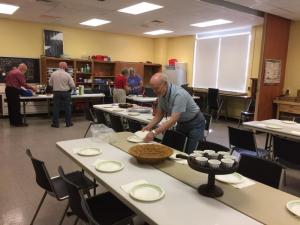Peace Corps veterans come together in Lewes
On the surface it looks like a dinner with friends, like many others that might take place at Different Kitchen in Paynter’s Mill.
On this night, the gathering is about 12. They order their meals and resume chatting with one another. What brings these people together is their experience: they are all former volunteers with the Peace Corps.
The group, Sussex County Returned Peace Corps Volunteers, has been meeting for over a year. The group was brought together by author Phil Fretz, who got the idea from a friend in Wilmington who met with a similar group in New Castle County. Fretz said the National Peace Corps Association, a national nonprofit for Peace Corps alums, keeps a database of former Peace Corps volunteers to help them connect. Fretz said from there, it was just a matter of sending out emails to get everyone together.
Among those in the group are Phil Stephenson, who served in Santa Cruz, Bolivia, from 1965-67. Originally from Indiana, Stephenson said he joined the Peace Corps to try to make the world a better place.
“Back in the day, we were doing it from here,” he said pointing at his heart, rather than here, pointing at his head.
“It was a town of 100,000, and all the streets were sand or mud. Today it’s 1.5 million and everything is paved. It’s a huge difference,” he said.
After the Peace Corps, he headed back to Indiana where he got a second bachelor’s and a master’s degree. Halfway through completing his doctorate, he decided to study abroad, this time to Lima, Peru.
Jim Welch, is the only Delawarean of the group. He served in the Peace Corps from 1973-75 in Ethiopia. Welch said he had a choice of five countries where he could serve. He picked Ethiopia because his favorite opera, “Aida,” has an Ethiopian as the main character.
“I called my mother up and said I was going to Ethiopia. She said, ‘What are you doing!?! I thought you were going to graduate school?’ I said, ‘No, I’m going into the Peace Corps.’”
Welch said he loved the country, and his parents eventually warmed up to it and came to visit him.
“There was no electricity. No running water. It was like the Boy Scouts,” he said.
He went to Ethiopia just as the country’s longtime emperor, Haile Selassie, was removed from the throne and then deposed in a coup.
“It was an interesting time for me, because you read about Haile Selassie and everything he did. During my last year was when he was deposed and the military took over,” he said.
Of his time in the Peace Corps, Welch said, “It was a great experience. I loved it. It changes who you are.”
Part of those changes is falling in love with the native cuisine. Welch and the group recently took part in a cooking class on African cuisine, with one of the classes devoted to foods of Ethiopia.
Outside events in America at the time were slow to get to the villages of Ethiopia. Welch said during his time there, Richard Nixon resigned as President, an event he did not hear about until months after it happened.
Pat Newcomb, a fellow Peace Corps alum who spent her time in the African nation of Gambia, said Voice of America was very valuable in helping them learn to distinguish propaganda.
Newcomb, a native of Dayton, Ohio, now living in Rehoboth Beach, said she loved the mishmash of languages and music she experienced in Africa. Like most of the group, she was a teacher, but she said being in a foreign land forced her to have to deconstruct what she knew and build it back up. Newcomb said the girls in Gambia were every bit as smart as American girls, but the opportunities for them were different.
“They didn’t act poor. They went to the market every day. They managed themselves and their families and danced and carried on,” she said.
Newcomb said seeing another way of life made her look at the world differently.
Ginny Fornillo, like Fretz, served in the African nation of Sierra Leone; Fretz served in the late 1960s, Fornillo from 1974-76. She said she got the news of Nixon’s resignation as she flew over there. She said the people she encountered in Sierra Leone could not believe that a president could be fired without a gunshot.
Originally from New York City, Fornillo was assigned to a place so small it didn’t have a market. She said early in her time there, the children had a custom of leaving the room to spit, which as a New Yorker was surprising,but she later found out it was part of the observation of Ramadan, the ninth month of the Islamic calendar in which adherents observe strict fasting from sunrise to sunset.
“I was in what they call, the Bush. I was truly at the end of the road,” Fornillo said. “I think I experienced the culture and the people more than others. I had no way to get out that wouldn’t take forever. I really appreciated the people and their views, their culture, their customs.”
Fornillo said she now enjoys the usually monthly or bimonthly meetups with her fellow Peace Corps alums. She said they like to share their experiences and discuss ways they can continue to make a difference in the world.
“It really influenced the rest of my life. I saw how differently people could live and how good they were. It wasn’t all about the U.S. I have a much wider world view,” Fornillo said.
Ryan Mavity covers Milton and the court system. He is married to Rachel Swick Mavity and has two kids, Alex and Jane. Ryan started with the Cape Gazette all the way back in February 2007, previously covering the City of Rehoboth Beach. A native of Easton, Md. and graduate of Towson University, Ryan enjoys watching the Baltimore Ravens, Washington Capitals and Baltimore Orioles in his spare time.





















































